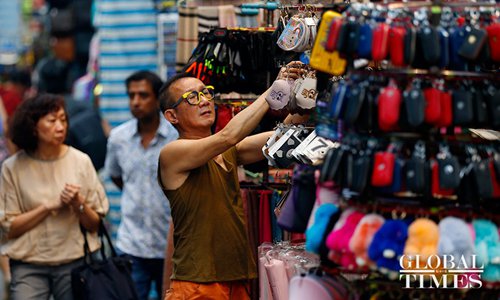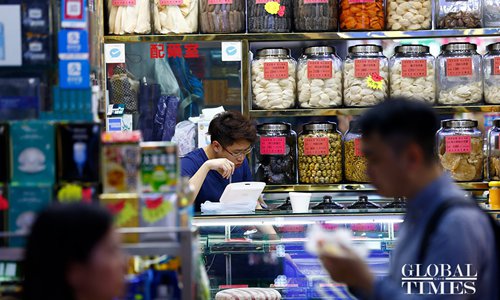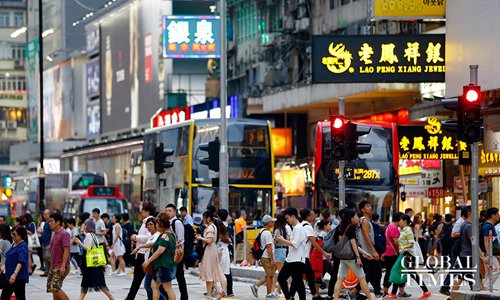HOME >> CHINA,SPECIAL-COVERAGE
Hong Kong to rekindle Lion Rock spirit of hard work
By Chen Qingqing and Fan Lingzhi in Hong Kong, Wang Wenwen in Beijing Source:Global Times Published: 2019/8/23 23:03:40
Young generations misinterpret city’s core values in protests
Anti-government protests, which enter their 12th week on Saturday, have taken their toll on the city's economy, public transport, hotel rooms and restaurants, leaving small and medium-sized businesses struggling.
Black-clad protesters have launched a citywide non-cooperation movement and have called on workers to strike.
On Wednesday morning, a giant banner showing an anti-government slogan appeared on Lion Rock, a symbolic location of Kowloon Country Park.
Residents who reject citywide strikes said they feel sad about misinterpretation of the spirit by the anti-government forces.
The spirit, supposed to represent the resilience and diligence of people in the Hong Kong Special Administrative Region (HKSAR), cannot be used to achieve political purposes.
Lai Siu Chung, a 48-year-old bus driver, starts work at 4 am every day and usually works more than 10 hours a day.
"I don't think young Hongkongers really understand what Lion Rock spirit is," he told the Global Times.

Photo: Cui Meng/GT
"Many of them complained about the HKSAR government, highlighting difficulties they face," Lai said.
"They express dissatisfaction by escalating the violence, which will ruin the treasure that we, as the elderly generation, have been striving for all our lives."
Anti-government protesters launched strikes in the public transport sector, urging bus drivers to join the movement earlier this month. Lai rejected this.
"Our work has been seriously disrupted, and we all feel the pressure," he said.
"However, Hongkongers should respect each other and express their opinions in a rational way."
To Lai, Hongkongers were born with perseverance. He believes it is the previous generations' contributions that make Hong Kong a prosperous international metropolis. Real Hongkongers are "modest and hard-working," he said.
He said he felt sorry that Hong Kong youngsters do not cherish their fathers' achievements through hard work.
"I hope they [protesters] could calm down and reflect, and that social order can be restored and tranquility returned to Hong Kong," said Lai. "And that Lion Rock spirit could be inherited."
A Cantonese song entitled "Below Lion Rock" contains the lyrics: "Hongkongers are in the same boat and help each other, abandoning differences to find a way out."
These words should be the core values that Hong Kong society holds today, residents told the Global Times.
Lion Rock spirit has thrived since the 1970s and has become a collective memory of older generations in Hong Kong, following that popular TV show Below Lion Rock about working-class people who lived below the rock.
That TV series and the song's lyrics focus more on Lion Rock instead of Victoria Peak as Lion Rock speaks of grass-roots residents wheras Victoria Peak more represents blue blood groups, said Hong Kong lawmaker Junius Ho Kwan-yiu.
"So Lion Rock is the best representation of Hong Kong's ordinary people," Ho told the Global Times.
Ho said that he and his peers followed in the footsteps of his uncle, who started from scratch and became the only well-known lawyer in his village.
Their class started rising when Hong Kong's economy began to take off.
.

Photo: Cui Meng/GT
In the same boat
With the rise of Hong Kong from a fishing village to an international financial hub, Lion Rock has become the city's most iconic sight with an evolving spirit.
On Wednesday afternoon, Global Times reporters visited Lion Rock Park, where rugged and bumpy roads lead to the mountaintop.
"There's no one in Hong Kong who does not know the Lion Rock. It is very symbolic. However, what it represents now could be interpreted in the wrong way," a middle-aged resident who lives in Wong Tai Sin told the Global Times.
Anti-government protesters have hung banners on the cliff in Lion Rock Park, trying to use the spirit of Lion Rock during their weeks of protests. Some even call it "the fight for Hong Kong."
Chan Kin-por, Legislative Council's Finance Committee Chairman, said his own experiences provide a far better interpretation of Lion Rock spirit.
Chan grew up in a poor family. He said his family background is the collective memory of Hongkongers born in the 1950s and 60s.
"We lived in shabby public housing without a private toilet and kitchen," Chan told the Global Times.
He worked at a bank after graduating from preparatory schools and gave up eight years of vacations to study to pass his insurance exam.
He said he leads a modest life and rarely goes to restaurants. He likes to climb mountains near his residence as "it costs nothing and is good for health."
Chan said that young people should seize and even create opportunities and make good use of their time and energy to fight for Hong Kong and themselves.
Decades ago, many people on the mainland moved to Hong Kong to seek better lives.
In spite of poor living conditions, they never gave up fighting for themselves and their families.
Ho told the Global Times, "Since that time, Lion Rock has become a common landmark for Hongkongers. It reminds us to disregard our differences and overcome difficulties as we're all in the same boat.
"We should not tolerate anyone sabotaging this boat for their own purpose," he said, noting that it is time for the younger generations to understand the core values of the city.
.

Photo: Cui Meng/GT
The real meaning
The success of Hong Kong today lies in the efforts of older generations and the hardworking middle class who helped elevate the city's economy to one of the most important free markets, a major transport and logistics hub, and the center of the global financial market.
"Compared to their parents, young generations today grew up in a comfortable environment. Many have not experienced hard times and the burden of supporting the whole family, like we did," Li Pui, chairman of Guangdong-Hong Kong-Macao Greater Bay Area Youth Society, told the Global Times.
With such a privileged environment, young protesters today lack the adventurous and fighting spirit for success through hard work, and instead resort to expressing violently their dissatisfaction with reality and shouting out anti-government slogans, he said.
A cartoon circulating on China's Twitter-like Sina Weibo platform paints an unflattering portrait of young protesters as though the thought of going to work or school the next day kills them. Cell phones are stuck to their hands and they reply to WhatsApp messages immediately. Their dorms are extremely messy. Other posts about the group suggest they do nothing but sleep and play video games. Many are unemployed, according to the cartoon.
Black-clad protesters have damaged public properties, scared away tourists and investors from Hong Kong, and injured police officers and ordinary passers-by, casting a cloud over the city's future development.
Some residents urged young people to cease the violence and reflect on what is the real meaning of Lion Rock spirit.
"They call themselves fighters for Hong Kong, but they are ruining the core spirit of Hongkongers and sacrificing the city's future for their own illusions," said Lai, the bus driver.
Witman Hung Wai-man, principal liaison officer for Hong Kong at the Shenzhen Qianhai Authority, said some young Hongkongers see Lion Rock spirit as outdated and belonging to older generations.
"They're now interpreting it as a way of fighting against the government, which is a distortion," he told the Global Times.
National People's Congress deputy Stanley Ng Chau-pei blamed education for a lack of Lion Rock spirit in youngsters.
"Education has its fair share to blame for hostility against the HKSAR government from young people involved in the violence. It is also against the Lion Rock spirit for many youngsters' anti-social violent behavior," said Ng.
"I hope the Lion Rock spirit, which represents hard work, mutual assistance and solidarity, can be inherited," Ng said.
Posted in: SOCIETY,HK/MACAO/TAIWAN,FOCUS NEWS